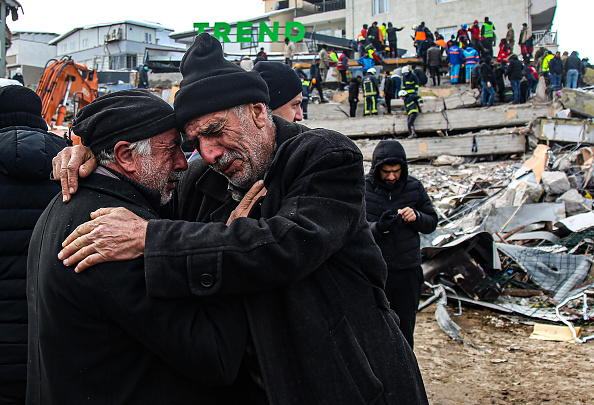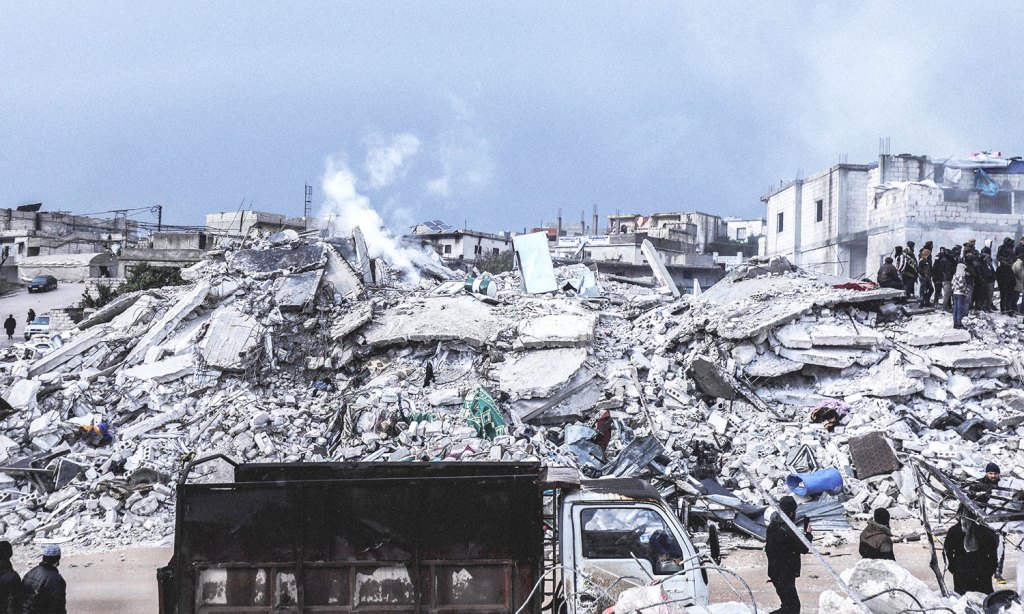A magnitude 7.8 earthquake struck near the Turkish city of Gaziantep, close to the Syrian border, on Monday, February 6. It’s the most devastating quake either country has experienced in over a century, and the scale of the destruction is enormous. The World Health Organisation (WHO) has warned that the death toll could continue to climb significantly as rescue crews work around the clock to pull survivors from the rubble.
The death toll on both sides of the border has now been confirmed to have reached beyond 41,000 as of Wednesday. The tragic milestone makes this the deadliest seismic event on the planet in over a decade, and the worst since the founding of the country of Turkey. Its death toll has now surpassed Japan’s tragic magnitude 9.0 quake, in which nearly 20,000 people were killed and the Fukushima nuclear plant went into meltdown. The 2010 earthquake in Haiti killed as many as 316,000 people, according to the Haitian government.
The quake hit at around 4:00 AM local time, with the province of Kahramanmaras at the epicentre. People were thrown out of their beds as the impact was felt as far away as Cyprus and Egypt, with dozens of towns and cities in between affected. Hundreds of aftershocks, some as large as 7.5 on the Richter scale, have rocked the region for days afterwards, hampering rescue efforts and leaving thousands of buildings reduced to rubble with people trapped underneath.
To make matters worse, the region is experiencing an extreme cold snap. Temperatures in Kahramanmaras are down to 3 degrees, and hundreds of thousands of people are without shelter, power, and food to keep warm. The UN is warning that, as of Tuesday, although some survivors are still being saved, hopes are fading that many more will be pulled from the rubble alive.
Turkey’s President, Recep Tayyip Erdoğan, has called the quake the “disaster of the century”, topping the 1939 Erzincan earthquake in which 33,000 people were killed. He has declared a state of emergency in 10 provinces. He confirmed that 47,000 buildings had either been destroyed or would need to be demolished.
“Because the debris removal efforts are continuing in many buildings in the earthquake zone, we do not know how high the number of dead and injured will rise [to],” Erdoğan said. “Hopefully, we will leave these disastrous days behind us in unity and solidarity as a country and a nation.”
Across the border, in Syria, the war-torn country was already struggling under the weight of humanitarian need after a decade of violence. The Syrian Civil Defence has declared a state of emergency and is working to rescue people trapped under buildings around Idlib and north-western Syria. It has been described as a ‘disaster within a disaster’.
The group has made a plea for aid from the international community and to put pressure on the Syrian regime, and its supporters in Russia, to pause airstrikes as they work to deal with the fallout. International charities have made similar calls for support.
What Is Being Done to Help Turkey and Syria?

Countries across Europe, Asia, and the Middle East have pledged their support to the regions affected. Turkey has said that offers of support have come in from 62 teams across 50 different national governments, including India, Russia, and China. Even Greece, which has a long-running dispute with Turkey, is sending aid.
The World Bank is providing US$1.78 billion to Turkey, while the US is sending US$85 million to both Turkey and Syria.
US President Joe Biden has said that he is “deeply saddened” by the loss of life in the region and has promised to work in cooperation with Turkey, providing “any and all needed assistance.”
The UK, for its part, will send a team of 76 search and rescue experts, along with specialist equipment and rescue dogs.
The Australian government has pledged $10 million in humanitarian aid to help with the devastation, with initial funding to be sent to the Red Cross and Red Crescent charities in the region. A 72-person search and rescue team is being sent to the region and is expected to arrive by the end of this week.
“Australia’s assistance will target those in greatest need,” Prime Minister Anthony Albanese has said.
All Australians are deeply saddened by the tragic loss of life and terrible devastation unfolding after the earthquake in Türkiye and Syria.
— Anthony Albanese (@AlboMP) February 6, 2023
Shortly after this disaster, our Foreign Minister, Penny Wong, announced that four Australian citizens, who were in the region when the earthquake struck, were unaccounted for. Three of those have since been confirmed to have died.
Vigils have been held in Melbourne for an 69-year-old grandfather, Suat Bayram. In Maryborough, Queensland, a tribute was held for the other victims. While the latter town has strong links with the disaster-struck country, going as far back as the Gallipoli campaign.
The Department of Foreign Affairs is providing assistance to a further 40 Australians and their families in the region.
How to Donate to Turkey and Syria

This massive earthquake has hit a region of the world where governance and leadership is light on the ground. Many Turkish people do not trust the government to distribute aid or carry out rescues properly. Anger is mounting in the country over what locals call a virtually non-existent response.
Erdoğan has said that 60,000 aid personnel are now on the ground and has hit back at critics, saying “dishonourable people” are spreading “lies and slander” about the government’s response.
“It is not possible to be prepared for such a disaster,” Erdoğan said.
While support for Turkey has been high, many countries have not jumped in to support Syria, given the dictatorial rule of the Syrian leader, Bashar al-Assad. Its believed that international rescuers will not go into the regions of the country where the quake hit hardest as it is currently an active war zone. As many as 4 million Syrians in the affected region are currently displaced and living in refugee camps.
Moreover, UN Resident Coordinator, El-Mostafa Benlamlih has said that damage to roads, damage to airports, fuel shortages, and the cold weather, are all making rescue operations incredibly difficult.
“We have to be creative in how to get to the people… but we are working hard,” Benlamlih told Reuters.
Turkish Vice-President Fuat Oktay has said that more than 8,000 people have been pulled from the rubble. 380,000 are currently living in government shelters, hotels, shopping centres, stadiums, and mosques.
If you’re looking to donate to alleviate some of this horrific suffering, there are a number of good, local organisations already on the ground that are crying for support.
How to Donate to Turkey
In Turkey, the three main organisations that locals are directing international support towards are:
AFAD
This is Turkey’s official Disaster and Emergency Management response organisation run by the Turkish government. They are seeking donations to assist with the provision of search and rescue, shelter, food distribution, and mental health support. Donations can be made here in Turkish Lira, US Dollars, or Euros.
AKUT
AKUT Search and Rescue is an independent non-government volunteer organisation. It has been operating since 1995, born out of a grassroots movement, and has attended both big and small disasters in the country for nearly three decades. AKUT was on the ground within an hour of the quake with 16 teams and over 200 volunteers. They are accepting donations in TL, USD, and EUR here.
#AKUToperasyon After the 7.7 magnitude earthquakes in Pazarcık district of Kahramanmaraş and then 7.6 magnitude in Elbistan district, our teams continue their work uninterruptedly.#eartquake #earthquakeinturkey pic.twitter.com/o6bvbBhdC3
— AKUT (@AKUTASSOCIATION) February 7, 2023
AHBAP
Another highly active, independently run not-for-profit volunteer network in Turkey. Their name means ‘buddy’ or ‘dude.’ They specialise in medical assistance, education, and supporting stray animals. AHBAP’s taking donations in Lira, USD, EUR, and GBP here.
How to Donate to Syria
Due to the crippling sanctions on Syria, sending money into the country is currently not possible. It’s also vital you look into exactly who you are donating to, as many online organisations and local ‘NGOs’ accepting donations may not be what they seem.
The following are vetted, reliable places to donate to:
Syrian Red Crescent
The Syrian Red Crescent is a local outfit of the International Red Cross and Red Crescent organisation. They have 14 branches across Syria and are currently working to deliver food and supplies to people in Hama, Aleppo, and Lattakia. Their website is currently down but you can donate to the International Committee of the Red Crescent’s Syrian crisis appeal here.
UN Syria Humanitarian Fund
The Syria Humanitarian Fund is a pool of money within the country that is managed locally by the United Nations. This money is used for rapid deployment during disasters so that support reaches people as fast as possible and when needed. You can top it up here in most currencies, including Australian Dollar.
MSF
MSF, or Doctors Without Borders, have been working tirelessly in the region for years and has announced that they’ve stepped up operations in both Syria and Turkey in response to the earthquake. They have been providing support in 23 medical facilities in north-western Syria and have ambulances on the streets collecting injured people. You can donate to them here.
The White Helmets
Arguably one of the most famous rescue teams in the world, the White Helmets are the Syrian Civil Defence; a humanitarian organisation made up of grassroots volunteers that sprung up to rescue people during the outbreak of the Syrian civil war. They are also heavily vilified and the subject of much disinformation online, so be careful what you read about them. They are currently working to pull people out of the rubble in Syria and are calling for donations. You can send them GBP, USD, or EUR here.
We still hear the cries for help from those trapped under the rubble. Many of our own families and neighbours have not survived. Thousands in #Syria are dead. Thousands more are missing. Please help us in our response by donating. #Earthquakehttps://t.co/wG2zZYfcbo
— The White Helmets (@SyriaCivilDef) February 7, 2023
Related: What We Know About Turkey and Syria’s Magnitude 7.8 Earthquake
Related: Putin’s War Crimes Have Shocked the World — A Journalist Details the Reality In Ukraine Right Now
Read more stories from The Latch and subscribe to our email newsletter.







